St. Demetrius (Demetrios) of Thessaloniki – Aug 7
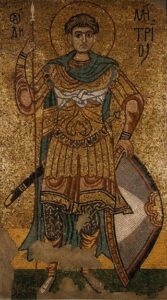
Holy, glorious, right-victorious, great-martyr, servant of our Lord, Demetrius of Thessaloniki the Myrrh Streamer, Myrovletes (myrrh-emitting) and wonder-working saint was born in Thessalonica to noble and devout parents of the Roman province of Macedonia. Implored of God by childless parents, Demetrius was their only son, and so was raised and educated with great care. Demetrius’s father was a commander in Thessalonica.
When his father died, Emperor Maximian appointed Demetrius as commander in his place and later he was selected as a tribune at the age of 22. His wisdom and distinction in battle earned him rapid advancement in the service of the Empire: in time he was appointed commander of all the Roman forces in Thessaly and Proconsul of Hellas. Emperor, an opponent of Christ, particularly recommended, that he persecute, and exterminate the Christians in Thessalonica. Demetrius, who had accepted Christ, not only disobeyed the emperor but openly confessed and preached the Lord Jesus Christ in the city of Thessalonica. He was adorned with the transitory glory which Demetrios had from his family, – imperishable virtues, with prudence, with sweetness, with humility, with justice, and with every noble comeliness of the soul. All these were like precious stones which shone on the crown which he wore, and this crown was the faith in Christ. When the emperor heard of this, he became furious with Demetrius. Despite this position in the still-pagan empire, he remained fervent in faith and works for Christ, encouraging many Christians to endure persecution and even bringing many pagans to the faith.
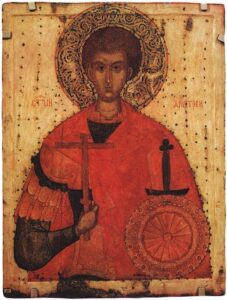
The emperor summoned Demetrius and questioned him about his faith. Demetrius openly acknowledged his Christian Faith to the emperor and also denounced the emperor’s idolatry. While in prison he was visited by a young Christian named Nestor, who asked him for a blessing to engage in single combat with the giant Lyaios (or Lyaeus), who was posing as the champion of paganism. Demetrios gave his blessing and Nestor, against all odds, slew his opponent in the arena, as David had once defeated Goliath. Maximian cast Demetrius into a fetid, stinking cell in prison, at the basement of a bath. Maximian brought with him the same huge barbarian of tremendous strength named Lyaios, who fought many men in the arena and defeated them all, to the entertainment of the Emperor and the crowds. An angel of God appeared to him in prison, saying: “Peace be to you, O sufferer of Christ; be brave and be strong!” Knowing what was awaiting him, Demetrius gave all his goods to his faithful servant Lupus to distribute to the poor, and joyfully awaited his imminent suffering for Christ the Lord.
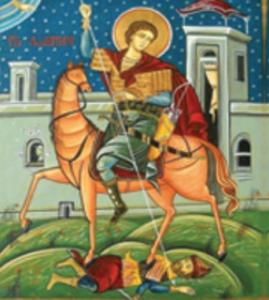
After several days, the emperor sent soldiers to the prison to kill Demetrius. The soldiers found the saint of God at prayer and ran him through with lances. At the age of thirty-six, when he saw the soldiers thrusting their spears at him, he raised high his arm and they lanced him in the side, so that he might be deemed worthy to receive the lancing which Christ received in His side, and there ran blood and water from the wound.
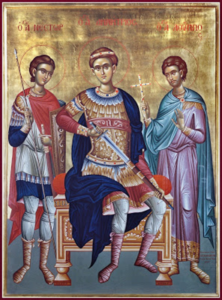
Demetrius’ servant, a believer named Lupus, retrieved the body of Demetrius, and buried it with honour. He kept the Saint’s ring and blood-stained tunic, and through them worked several miracles and healings. When the Emperor heard of this, he had Lupus, too, beheaded. Christians secretly took his body and honorably buried it. Healing myrrh flowed from the tomb of the martyr of Christ, curing many of the sick. Faithful people collected myrrh in flasks made of glass, clay, called ‘coutroubia’. This myrrh is a miracle of God and remarkable blessing to the faithful Christians, who call upon his sleepless intercessions. Soon, a small church was built over his relics. There are many witnesses to the myrrh of St. Demetrios and till today many receive the blessings of the myrrh and get grace of God.
An Illyrian nobleman, Leontius, was afflicted with an incurable illness. He hastened, with prayer to the relics of St. Demetrius and was completely healed. In thanksgiving, Leontius erected a much larger Church on the site of the old church. The saint appeared to him on two occasions.
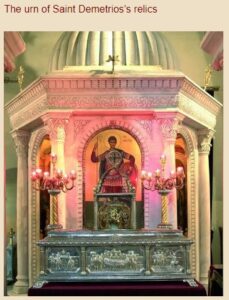
When Emperor Justinian wanted to translate the relics of the saint from Thessaloniki to Constantinople, flaming sparks sprang from the tomb and a voice was heard: “Stop, and do not touch!” And thus, the relics of St. Demetrius have remained for all time in Thessalonica. Over his holy grave and the place of his holy martyrdom there was built a Church in the form of a basilica which stands to this day. St. Demetrius is revered as the patron saint of Thessaloniki and is believed by the people as having intervened to save the city over the years from invading foreigners, from the Slavic nations, Bulgarians, Arabs, Saracens, and others.
As the protector of Thessaloniki, St. Demetrius has appeared many times, and on many occasions has saved Thessaloniki from great calamity. His miracles are without number. The Russians considered St. Demetrius to be the protector of Siberia, which was conquered. His feast day in the Eastern Orthodox Church is Oct 26/ Nov 8. Demetrios was credited with many miraculous interventions to defend the city of Thessaloniki and is one of the most popular saints in the Orthodox world.

0 Comments